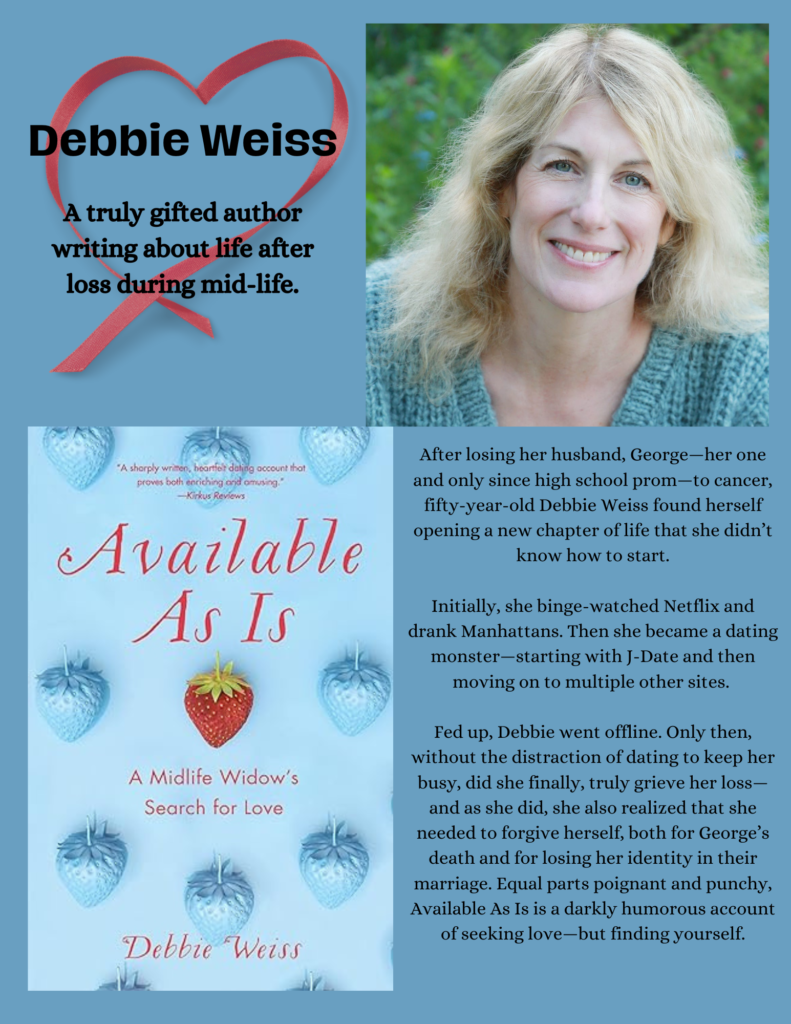Loneliness equals shame. The hardest thing I went through after George died was being lonely. With few friends, no kids, and a family consisting of my elderly dad and step-mom, I’d sit at home at night and think, “Who’d notice if I vanished?’
“I’m alone because my husband died,” became, “I’m alone because no one likes me.” Suddenly, I was back to being an unpopular geek in high school spending my weekend nights with Dr. Demento and an un-opened geometry book.
I get the most writing from people in their second year of widowhood. ”Where did everybody go?” they ask.
Offers of walks and dinners have dried up. Friends have stopped checking in on them. The searing pain is still there but the companionship has vanished. Or maybe the pain has abated enough that we look around and ask, as I did in my second year, “Is this all there is to my ‘new’ life?” I also wrote these really sad articles where people would ask in the comments, “Are you going to be okay?”

I found it so hard to reach out, to tell someone, “I’m lonely. I could use some time with a friend.” Maybe follow that up with, “Do you want to go for brunch this weekend?’
And the predictable answer, “Oh, Thanks but I am just so swamped.” And the extra dollop from the particularly insensitive, “Just get out there!” And let’s not forget those who reel off a list of activities which ostensibly could include another person, but apparently, not you.
We don’t talk about loneliness like it’s an illness. But it seems like one to me.
A big umbrella of an illness with many different causes and varied symptoms. I started having anxiety attacks at night, hyperventilating because I felt so unbearably alone in my own house.
I drank too much to numb out my feelings. I was angry because I felt so cut off from people. I was a scary driver. I wasn’t sure I wanted to continue living. I’d seen my husband through cancer but who cared about me? When a man came along who told me I was beautiful and that he loved me, I let him practically move in with me.
We would suggest, however, that seeking counseling or a bereavement group is usually better than seeking sex right away in order to sort out your feelings.
~ Kubler-Ross and Kessler, On Grief and Grieving
But aside from therapy, they don’t say what you should do. We should be having dialogues on how to help the unbearably lonely. I’m not alone in losing my spouse of many years and feeling alienated. Or thinking I was going out of my skull being alone. Or doing things I wouldn’t have done were I not so desperate for human contact.
Let’s TALK about loneliness
Maybe the dialogue about loneliness could have a part about how to help someone who’s suffered a loss by talking to them. All you have to say is, “I’m sorry. Would you like to get a coffee and talk?” But people don’t seem to know that. I found out later that some people didn’t contact me after George died because they were uncomfortable talking about death. Not knowing what to say, they stayed away.
Being lonely is stigmatizing. People don’t seem to get that when you’re on your own, a simple dinner out can mean the difference between sitting at home lamenting our losses and thinking that this new life too can be good. I wish people reached out instead of shying away when you say you’re widowed, often saying “that’s my worst fear” or “I couldn’t deal with it.”
Widowhood is not contagious. And resilience isn’t something we do in a vacuum.
I’m a writer who spends most of her days alone with an iMac. As the world, or at least California reopens, I’m thinking about (1) how to be less lonely in my own life and (2) how to help people who are lonely.
So, I resolve to:
- Reach out more. As a single person, you have to schedule everything. You don’t have someone to drag out the door with you when you want an iced latte or a stroll. I will reach out at least once a week to set something up.
- People talk about volunteering as a way to deal with loneliness. I’ve volunteered with a couple of groups and I’m teaching a writing class. I’m also thinking about starting a local grief group, maybe combined with walking and/or coffee.
- I will be sharing space with my partner of several years. I’ve lived alone for almost seven years. With no disruptions in my space. Or my decor. Or my meal plan of many, many salads. Wanting something does not mean it will end…It will just be more cluttered.
Now, let’s get to you if you’re feeling lonely:
- Try taking a class or joining a group in something that interests you. When George died, I tried joining a synagogue (even though I’m not religious), a car club, Rotary (no one who knows me believes this), and something about connecting with my divine feminine. I tried working at our local bookstore before realizing I’m a curmudgeon. What stuck for me was yoga, writing, and later, hiking. Maybe try one thing a month until you find something that resonates.
- If you’ve been procrastinating on dating, stop putting it official that feels right for you. You can meet people in a public place for a drink or coffee, devote an hour, and be on your way. Online dating lets you see a lot of what’s out there. It’s how I met my person. And that did change my life. My handy checklist helps you how to tell if you’re ready to date after loss. But also embrace being single if that’s what’s right for you. Society places far too much emphasis on being partnered. But one isn’t better than the other. It’s living your own truth.
What have you done to cope with loneliness? And if you’re going to start dating again, what can I help you with?
Connect with me on Twitter, Facebook, Instagram, or Medium, and be sure to sign up for my newsletter!


